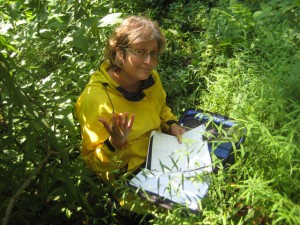John Morgan (@JMorganTHE) and Chris Havergal's (@CHavergalTHE) wide-ranging article in the Times Higher Education magazine describes the stresses and strains on the clear glue that holds the global higher education ecosystem together. All of the invisible work that we do beyond our research and teaching can be loosely termed "administration", or community-building, or academic citizenship.
 Here's the thing: most people outside of academia don't get what I do as a professor. Back in the 1990s, my kindly, now dead, neighbour would ask if I was having a nice summer holiday, even as I was doing 12 hour field days, up to my neck in poison ivy. This is why I am very keen on public outreach and engagement for science.
Here's the thing: most people outside of academia don't get what I do as a professor. Back in the 1990s, my kindly, now dead, neighbour would ask if I was having a nice summer holiday, even as I was doing 12 hour field days, up to my neck in poison ivy. This is why I am very keen on public outreach and engagement for science.
My current concern is that I have written 15 references since January 1st:
Students applying for graduate scholarships (3),
Students applying for Master's and PhD programmes (5),
Students applying for internships (2),
Colleagues applying for tenure-track jobs (2),
Colleagues applying for prestigious awards (3).
I have also read approximately 90 academics references in January, because I am on a hiring committee for a biology lecturer.
I wasn't surprised to read Stephen Mumford's comment about Reference Madness in Reference writing: may I recommend reform?
"if 20 per cent of my authored output is the writing of references, and it takes up a day of my working week, then something is out of balance".
Oh dear, references are, to date, my largest academic output of 2015. But, I was shocked to see @SDMumford's reference to 6-page references; mine max out at 2 pages and I don't read beyond page 2 of any reference.
Furthermore, with respect to those academics who commented in Morgan and Havergal's Is Academic Citizenship Under Strain, that some selfish "careerist" types just won't do this basic, unsung citizenship, I was horrified, last week, to hear the following story from one student who asked me for a reference for her Master's programme applications.
I had taught this student in 2 courses in 2014 and I asked her who would write her other references. She reported that one of my colleagues, with whom she had also taken 2 courses (one lower year and one upper year), in both of which she had received A grades, had DECLINED to write her a reference for her application because she had not worked (volunteered?) in their lab. I was shocked: this professor will apparently only write academic references for undergraduates who have worked for them? The ethical implications of this statement are mind-blowing. I helped the student to find another reference writer and also urged her to write again to the reference-declining professor, asking them to clarify their position. I advised the student to copy her email to my department chair, so that he can follow up.
Now, about those overdue research grant reviews, my book that needs updating and those 6 research articles...
Dawn R. Bazely

